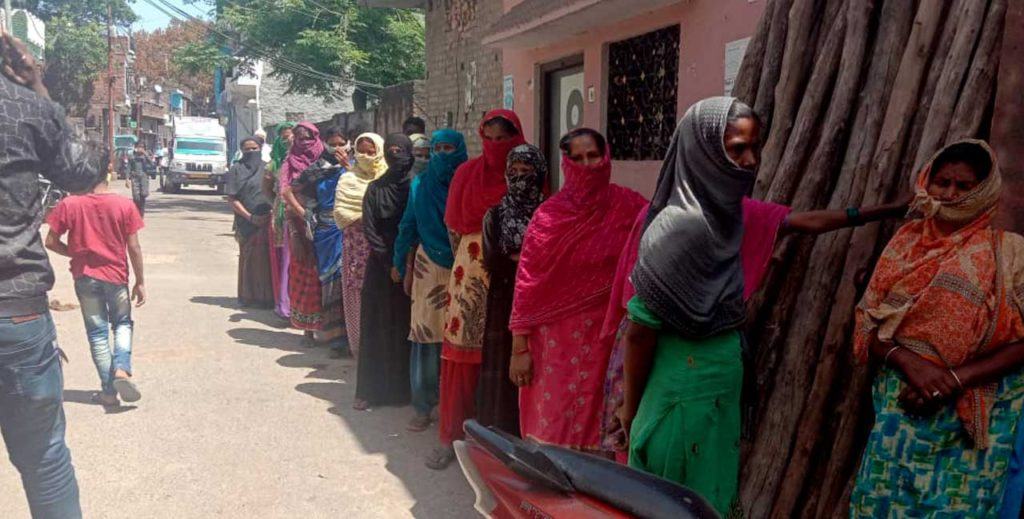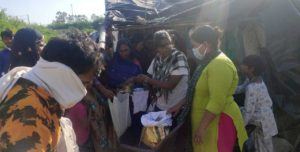
When India’s Prime Minister Narendra Modi declared — with only a few hours notice — that the country would be locked down starting March 24, millions of people were left completely stranded. For migrant workers across the country who had come to cities for work, job opportunities dried up in an instant, and they were left with no income, sometimes hundreds of miles from their villages. AJWS grantee HUMSAFAR, a support center for women and girls in crisis in the northern city of Lucknow, sprang into action, distributing emergency food aid to migrant workers as they fled the city on foot.
Below, please read their account of this massive humanitarian crisis — and their powerful, inspiring response.
A Letter from HUMSAFAR, Lucknow, India
Humankind is facing perhaps one of its worst crises in generations. While the disease has taken a huge toll on the developed world, where countries like the United States are losing more than a thousand lives a day, the crisis in India acquires an altogether different dimension. Here, it is so much more than a health and economic crisis. It is a threat to the very survival of entire communities.
For some Indians, our current lockdown means giving up a few things. For others, it is the challenge of keeping body and soul together.
The price that many of India’s poorest and most marginalized people are paying is almost unimaginable. At one stroke, they have been left entirely at the mercy of their own fate, stranded in cities they serve and earn their meagre livelihood, suddenly uprooted like an unwanted apparatus.
Following the start of India’s violently enforced lockdown, we all have seen the mass exodus of migrant workers trekking hundreds of miles with only their children and a few belongings to reach their villages and homes. They carry fear in their hearts and uncertain future. And on top of these immense fears, they face deep-rooted social prejudices, which have already resurfaced with horrifying results.
It is in this context that HUMSAFAR, a support center for women in crisis in Lucknow, had to step in. We are not a relief organization, but in times of a crisis of such monumental dimensions, we must stand with our principles of social justice, equality and equity to build a just, human society.
And hence are reaching out to migrants fleeing our city, as well as the hardworking people we’ve always supported who call Lucknow home: a large number of local domestic abuse survivors (mostly single mothers), the women rickshaw drivers trained through HUMSAFAR programs, and our extended family—women activists who have always been agents of change in our communities.
Listening to the desperate calls for help rising from our city, HUMSAFAR decided to take up the challenge of providing these people with basic provisions. We saw our state government trying to do the same; they have failed miserably. We hope that India’s government can mobilize an effective response to widespread hunger—but we simply cannot wait while they do. People are starving.
Our team has begun working within Lucknow’s vast bastis—or slums—where people survive in poverty in extremely crowded neighborhoods. Social distancing is impossible in these areas.
We have collected resources from family and friends—and thus far, we’ve been able to provide dry foods and fresh vegetables to a sizeable number of women abuse survivors, rickshaw drivers, and many other women from the communities we serve.
We’ve are providing cooked food to women who, due to psychological issues, are unable to cook for themselves. In several cases, we are providing medicine.

We know some who need help most desperately do not live here—they are migrant workers now forced to return home with no income. We have reached out to many migrants as they walk out of Lucknow, distributing bread and biscuits wherever we can. This is not enough for their journey—sometimes hundreds of miles on foot—but every bit of food is critical right now.
Thankfully, we are not alone.
HUMSAFAR has convened with a network of other NGOs, concerned citizens and activists working together. We are cementing the relationships with volunteers who have worked with us to build a better world year after year. We’ve joined a national-level network of gender rights organizations, opening phonelines and WhatsApp channels to support domestic abuse survivors.
This is not just a struggle against COVID-19. This is a struggle for social and economic justice. A struggle for feminist principles. A struggle to build a more inclusive society. And for as long as it takes, we are in this fight together.
In solidarity,
The HUMSAFAR Team
Lucknow, India
AJWS’s work in countries and communities changes over time, responding to the evolving needs of partner organizations and the people they serve. To learn where AJWS is supporting activists and social justice movements today, please see Where We Work.
